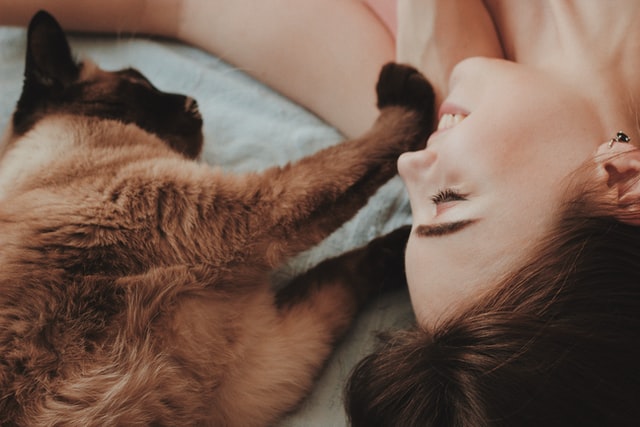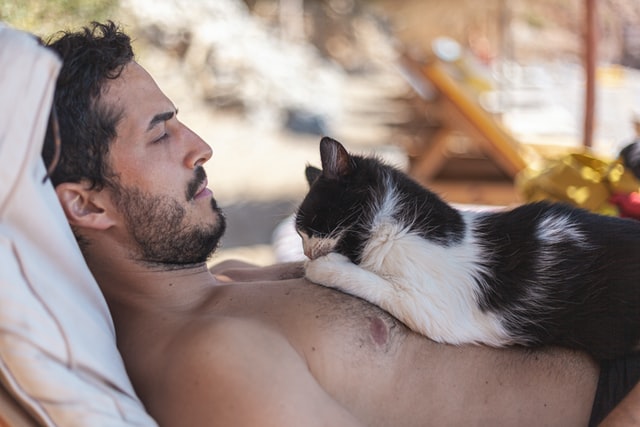4 Ways That Cats Can Sense Our Emotions
Cats have always been known as the graceful yet aloof creatures of the pet world, but do they care more than they put on? Can they actually sense human emotions? And if they can, does that mean they care?
Research shows that cats can sense human emotions. They do so by observing facial expressions, listening to the tone of voice used, reading body language, and noticing situational cues. Cats likely read these different cues to see how they will be affected, but they may also change their behavior to improve their owner’s mood.
Australian families love their animal mates, with about 61% of households owning a pet. Of that amount, cats are the second most common pet, with 27% of families owning a feline companion. If you are a cat carer, you will be intrigued to learn how our intelligent feline friends may be noticing more about us than we give them credit.
4 Ways That Cats Can Sense Our Emotions
Cats are extremely intelligent creatures, and they can use their senses to observe their owners and environments in four unique ways.

Our Facial Expressions
A study done in 2015 suggests that cats can decipher facial expressions. Moriah Galvan and Jennifer Vonk, two professors at Oakland University in Rochester, Michigan, US, studied 12 cats’ behavior, comparing how they reacted with strangers and their owners dependent on emotional facial cues.
The humans of the study were instructed to display a clear emotional condition. A happy expression was shown by relaxing the face and smiling, while an angry state was displayed by clenching the face, furrowing the eyebrows, and setting the mouth firmly.
When confronted with a smiling owner, the results showed that the pets were much more likely to display positive behaviors such as sitting on their owner’s lap, rubbing against them, or purring. The cats also spent more time with their owners when they were smiling.
This study shows that cats can read their owners’ faces and that they respond positively to what they perceive as positive expressions. While we may not know the exact motive for the behavior, it does show that cats pay attention to their owners and are not as disinterested as they may seem. Those who own catteries should not get too excited, however.
When confronted with smiling or frowning strangers, it seemed to make no difference to the cats as their behavior was not affected one way or the other. So it would seem that it takes the cats some amount of time to recognize their owner’s facial cues. Or perhaps cats can notice the difference in all humans’ facial expressions but do not give it any attention unless they have made a previous social connection with the human.
The Tone Of Our Voice
Cats have an amazing sense of hearing, and they can differentiate between different tones and pitches of voice even better than humans can. Cats can use their hearing to sense our emotions through the tone of our voice. With their sensitive ears, cats can pick up on if you have raised your voice or the intonation of your voice.
If your tone indicates that you are angry, you may notice that your cat may run from you and try to hide. If you are tense, your cat can likely sense that you may react in a stressed manner in your voice. Cats will likely want to spend more time with their human if the owner uses a pleasant, calm tone when speaking.
One study published in the journal Animal Cognition supports the conclusion that cats do sense their owner’s emotions through their voice tone. In Italy at the University of Milan, the study put 24 cats with their owners in an unfamiliar situation, a room with a running fan with plastic ribbons attached to it.
The owners then spoke to their pets while looking from the cat to the fan, using either a positive, happy voice or a fearful voice. Over three-fourths of the cats looked between their owners and the fans before attempting to approach the fan, and many of the cats changed their behavior based on the owner’s tone of voice.
The cats’ behavior seemed to change more for those whose owners used a negative emotion when speaking. This seems to suggest that the cats were likely looking for security from their owner in what they perceived as a stressful situation.
Our Body Language
While we cannot communicate with our cats through spoken language, we can communicate through body language. Not only can humans get to know how their cat is feeling based on these nonverbal clues, but cats can also become familiar with their owner’s gestures and other cases of body language. Cats may come to understand our emotions through our body language.
In the study done on 12 cats in Michigan mentioned previously, the owners also used specific body language to show how they were feeling. For instance, some owners were instructed to sit upright, leaning slightly forward, with arms tensed and hands clenched. Others sat cross-legged, with relaxed posture and arms resting loosely—these body language cues affected how the felines interacted with their humans.
Performing positive gestures like petting, beckoning with hands open and palms up, and tilting your head to the side will send the message that you are ready to engage in positive reinforcement and will likely motivate your cat to come to you.
Using gestures like putting your head in your hands, looking down, or even crying may signal to your cat that you are feeling down, motivating them to come to you for a petting or cuddling session. And angry gestures such as waving your hands around or making fists with your hands are likely to send your cat running and to look for a place to hide.
Situational Cues
Cats are very intelligent, and they may come to associate certain cues you give with how it will affect them personally. For example, when you spend more time in bed or lounging on the couch, cats may be more likely to spend time with you.
Some owners feel that their cat knows that they are sad and is trying to comfort them. This may be the case- we have no way of knowing their motivations; however, it may be that cats realize this is the perfect time to get some nice petting or cuddling in. Although their motives may not be altruistic, you can still reap the benefits of their attention.
Cats also participate in social referencing, in which they will look to their owners for guidance when they are in unfamiliar situations. They are likely trying to gauge your feelings and reactions by observing your facial expressions, body language, tone, and other clues to determine the situation’s safety and how they should react.

How Cats Can Affect Our Emotions
Unfortunately, a way to speak with cats has yet to be invented, so we can not be sure why cats act the way they do around their humans. They may genuinely love their owners and want to improve their mood when they sense they are down, or they may be acting in self-interest: you probably feed them more and give better pets and scratches when you are happy. We’ll hope it’s the former motivation.
No matter what their motive may be, cats can help their owners be happier and healthier. Here are a few ways how.
Their Purring
Cat’s purrs often have a peaceful and calming effect on their owners, reinforcing the bond between cats and humans. Besides just making our hearts feel warm and fuzzy, cat purrs may also help medically.
Research shows that a cat’s purrs can lower stress levels and reduce blood pressure. In fact, one study done over a 10-year period showed that cat owners were 40 percent less likely to have a heart attack than non-cat owners.
Interestingly, it is also believed that cats’ purrs’ frequency can benefit their own health as it may help with “infections, swelling and pain, muscle growth and repair, tendon repair and joint mobility.“
Kitten-Like Behavior
From a young age, kittens learn that by doing certain behaviors, such as kneading their paws, raising their tails, and rubbing against their mothers, they will receive positive reactions from their mother, such as grooming and feeding.
Cats use this same behavior with their owners. Many interpret this as showing that the cat sees the human as its parent and truly feels a strong bond and attachment to their owner. Whether or not this is true, this comforting kitten-like behavior will likely improve your mood.
Making Us Laugh
Perhaps an indirect effect, but noteworthy nonetheless, cats often make us laugh. This is often due to their personality and curious nature. Cats like to investigate their surroundings, and their reactions to a new or surprising stimulus can be hilarious. There is a reason they say laughter is the best medicine, and laughing at our adorable pets can put us in a better mood.
Help With Depression
One symptom of depression that many people report is not getting out of bed or keeping to a daily routine. Cats can help their owners as they are a responsibility that may help motivate depressed individuals to complete necessary tasks to take care of their pets.
Cats can also help relieve depression symptoms by soothing their owners with their calm demeanor and reducing loneliness by loyally sticking close to their owners and providing a steadfast companion.
Provide Support As A Therapy Cat
While dogs may be more well-known as playing the part of service animals, cats can also play a great role for special needs people. Those with Autism may benefit from a relationship with a cat, as evidenced by the experience of one little girl named Iris.
Now 11 years old, Iris received her cat Thula when she was just five years old. Her parents reported that they became immediate close friends. They noticed an almost immediate increase in Iris’ attempts to communicate as she would try to give instructions to her cat. Her mother also says that the cat’s “presence and gentle nature“ had a wonderful effect on Iris.
Individuals with Autism are not the only ones who can benefit from the support of cats. There are many accounts of cats who have helped seniors, those with Post Traumatic Stress Disorder, and individuals who suffer from anxiety disorders. In fact, more and more cats are being trained as emotional support animals and some are even getting trained as therapy animals.
How Our Emotions Can Affect Our Cats
One study done by a California college professor shows that cats produce oxytocin, nicknamed the “Love Hormone,“ the same hormone that humans produce when around their loved ones. The research believes this may mean that the cats can feel love for their humans as well. This may be why a cat acts lovingly towards their owner and often wants to receive caresses and other forms of affection.
Those who are a bit more practical interpret feline behaviors towards owners from a selfish standpoint, believing that cats pay attention to their humans’ emotions to determine how they will be affected.
For instance, a happy human is much more likely to give positive reinforcement, such as treats or a head scratch. A lonely or sad person may give more attention and petting, while an angry person will be less likely to spoil their cat.
While the owner may want to believe their pet is trying to make them feel better, it may really be that cats want to spend more time with us because of what they will get out of it. However, research does show that all mammals, including cats, can feel basic emotions such as happiness, sadness, anger, and fear.
Keeping Cats Happy
So, if our cats do feel their own emotions, will they be in tune with our feelings? Well, according to one doctor, it is possible that our stress can cause our cats to become stressed.
Dr. Fern Crist of the Cat Hospital of Fairfax, Virginia, US believes that an owner’s stress, such as financial problems, new babies, marital issues, and even house remodeling, can affect the pet cat. He notices manifestations of the stress in undesirable behaviors, such as a withdrawn or aggressive manner or inappropriate urination. Extreme stress can even cause physical illnesses to develop in a cat.
To keep our cats healthy and happy, we should do our best to provide a calm and peaceful environment, providing necessary provisions, as well as comforts that our feline friends enjoy.
Why The Bad Reputation?
While new studies show that some cats pay attention to their owners and modify their behavior according to emotional cues, cats do not seem to show empathy and understanding of human emotions and their canine counterparts. There are three possible theories about why this is the case.
The first reason is that compared to dogs, cats have a relatively short history of domestication. According to studies, dogs have been domesticated from around 18,000 to 30,000 years ago, while cats have been domesticated for about 5,000 to 10,000 years.
Some even claim that cats are only semi-domesticated as scientists who study the feline genome have found very little difference between wild cats and the average house cat. This relative shortness of domestication means cats have had less time to develop the ability to understand human emotions.
Breeding Differences
A second possible reason for the assumed indifference of cats is that they have not been selected and bred as dogs have. Dogs, especially hunting dogs, guard dogs, and the like, are often bred for their ability to respond to humans quickly, while this is not usually the case with cats. Since they have not been developed through selective breeding, cats have not developed this ability as well as dogs have.
A final theory is that dog and cat personalities are directly related to their ancestors’ “pre-domestication evolutionary history.“ Dogs are descended from wolves, which are pack animals and incredibly social creatures. Modern domesticated cats are descendants of the Felis silvestris lybica species, a very solitary wildcat.
Despite these historical and genealogical theories about cats, you will find no shortage of anecdotal evidence that cats can be loving, empathetic companions to their pet owners.
Conclusion
While dogs may be hailed as the pet world’s friendly heroes, it seems cats may have gotten a bad wrap for being standoffish, disinterested, and uncaring. While there are certainly individual cats with this personality, just as there are individual dogs and humans who exhibit these traits, it would be wrong to cast all cats in this mold.
New studies show more and more evidence that cats pay attention to their humans, understand their emotions based on certain cues like facial expressions and tone of voice, and seek their input when faced with new, uncertain situations.
With more and more study programs becoming available, like the Certificate of Cat Psychology and Training available through Australian Online Courses, we will hopefully be learning more about how to understand these fascinating animals in the near future so that we can develop even closer bonds with our fantastic feline friends.
